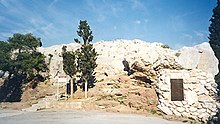
Back Areopagos Afrikaans اريوباغوس Arabic Areopaq Azerbaijani Ареопаг Bashkir Арэапаг Byelorussian Ареопаг Bulgarian Areopagos Breton Areòpag Catalan Areopagus CEB Areopág Czech


The Areopagus (/æriˈɒpəɡəs/) is a prominent rock outcropping located northwest of the Acropolis in Athens, Greece. Its English name is the Late Latin composite form of the Greek name Areios Pagos, translated "Hill of Ares" (Ancient Greek: Ἄρειος Πάγος). The name Areopagus also referred, in classical times, to the Athenian governing council, later restricted to the Athenian judicial council or court that tried cases of deliberate homicide, wounding, and religious matters, as well as cases involving arson of olive trees, because they convened in this location.[1][2] The war god Ares was supposed to have been tried by the other gods on the Areopagus for the murder of Poseidon's son Halirrhothius (a typical example of an aetiological myth).
- ^ MacDowell, Douglas M. (1978). The law in classical Athens. Ithaca, N.Y.: Cornell University Press. p. 27. ISBN 9780801493652. OCLC 20663324.
- ^ Pseudo-Aristotle. "Atheneion Politeia". Perseus. Perseus Tufts. Retrieved 8 February 2016.